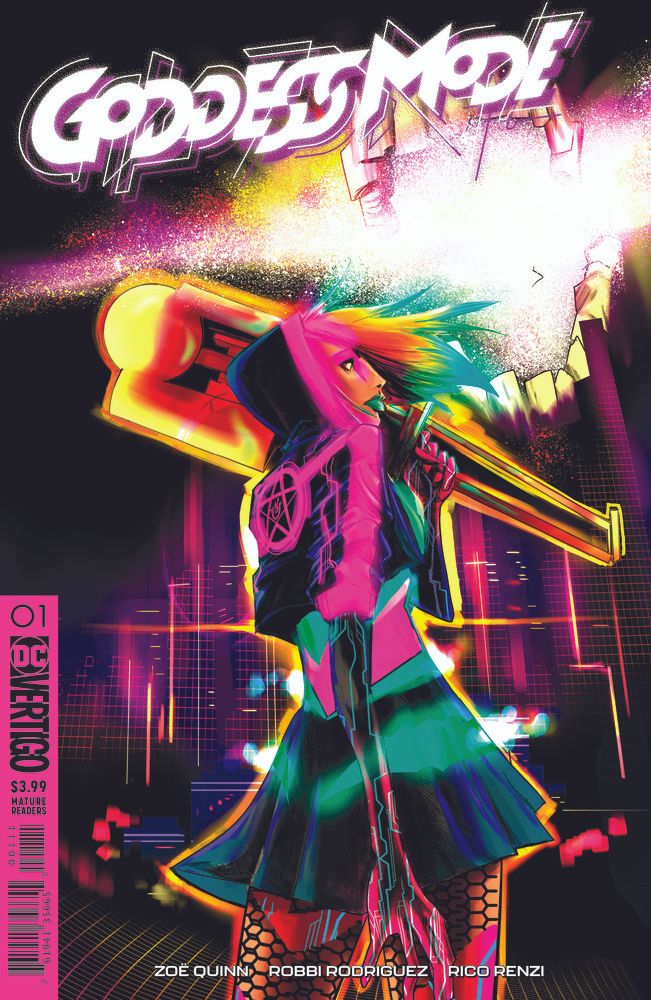REVIEW: Goddess Mode #1
- WRITER
- Zoë Quinn
- Artist
- Robbi Rodriguez
- Letterer
- Simon Rodriguez
- Cover Artist
- Robbi Rodriguez
- Publisher
- Vertigo Comics
- Price
- 3.99
- Release Date
- 2018-12-12
- Colorist
- Rico Renzi
We're going to go out on a limb here, and guess Zoe Quinn is a fan of the work of cyberpunk godfather, William Gibson. So much of the world the video game developer-turned comic scribe has stuffed into the first issue of Goddess Mode is rather reminiscent of the writer's works, though this observation isn't intended as a slight against this issue. Tons of great works have aped Gibson's work. Comics like Tokyo Ghost, Transmetropolitan, and Hard Boiled wouldn't exist without the writer's contributions to the science fiction genre. And what eclipses Quinn's perceived affinity for Gibson's work in the pages of Goddess Mode is her familiarity with the tech world and programming . This certainly gives her an edge when writing compelling plot beats about a godlike artificial intelligence that basically runs the our entire lives. It seems as if she is taking her experiences from her industry and applying it to an exaggerated, macro level, and the results are pretty solid, but not without faults.
Let's get the bad out of the way first: Goddess Mode #1 has some serious issues beyond the comic's heavy-handed analogies of technology becoming omnipresent in our lives and how it could supervene the notion of a higher power. But that's not the issue's true weakness; Goddess Mode's greatest sin is its inconsistent tone, which is really prevalent in its dialogue. A lot of the conversations between characters in this issue trail off into expository backstory and techno babble that are occasionally punctuated with either a cringe-worthy pop culture reference or profane exclamatories in the place of actual jokes. This makes the writing feel somewhat lazy, which is a shame since Quinn has proven herself to be proficient in other literary fields.
RELATED: INTERVIEW: Zoë Quinn Enters the Comics Industry with Vertigo's Goddess Mode
While Goddess Mode has a lot to say, it struggles to get to the point without a deluge of unnecessary hand-holding. To be fair, this could all be chalked up to first issue jitters. Not every debut new science fiction/fantasy series this year is going to have the same level of gravitas as comics like Farmhand or Self/Made -- and that's okay.
Now, just because the writing suffers from inconsistencies, does that mean this comic is bad? No, not at all; Goddess Mode is mostly enjoyable. The world that has been built by Quinn and artist Robbi Rodriguez, as well as the conceit of the story, are fascinating. While a technologically augmented reality is nothing new, this specific take is quite unique and has endless possibilities. The character of Cassandra Price could possibly go on the next landmark hero's journey in comics; she has all the gumption to do so, even if her babbling can be distracting. Here's hoping that's just a character trait that battling the monsters in the machine will help purge from her system. It's fine to have unlikable protagonists, but having an obnoxious one is a different story altogether.
RELATED: Goddess Mode #1 PREVIEW
Rodriguez's artwork is, as expected, fantastic in. His work is hyperkinetic when it needs to be, and his character designs are just far removed enough from present day fashion to make the world feel as if it's set in a not too distant future. Rico Renzi's colors elevate this feeling perfectly, making the candy-colored realm of Azoth jump right off the page. Solid work all around.
Goddess Mode #1 just doesn't reach the level of greatness it strives for, and that's fine. It's not a bad comic, or "SJW propaganda," or whatever some YouTubers are going to chastise it for being. It's just okay. It's a PB&J sandwich with the crusts cut off. Nothing special, but certainly not offensive. If someone out there loves this comic, then that's great! No one should rain on their parade. Love what you love, and damn everything else.

